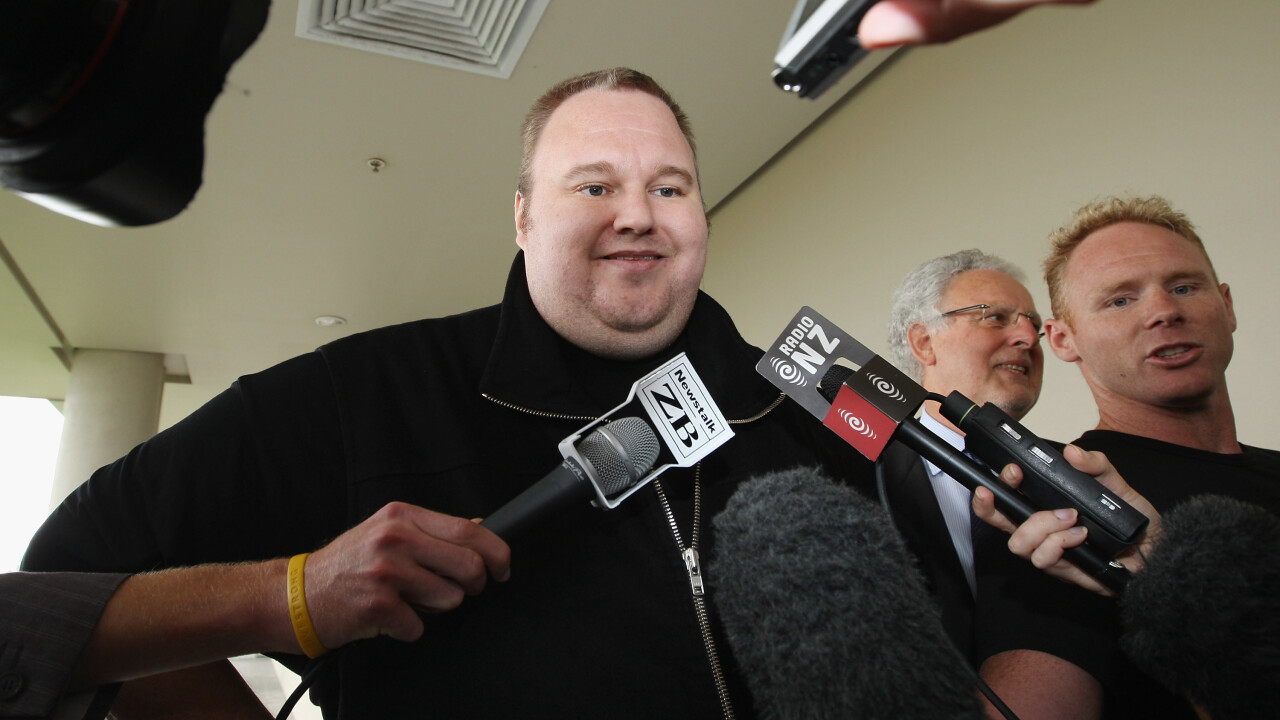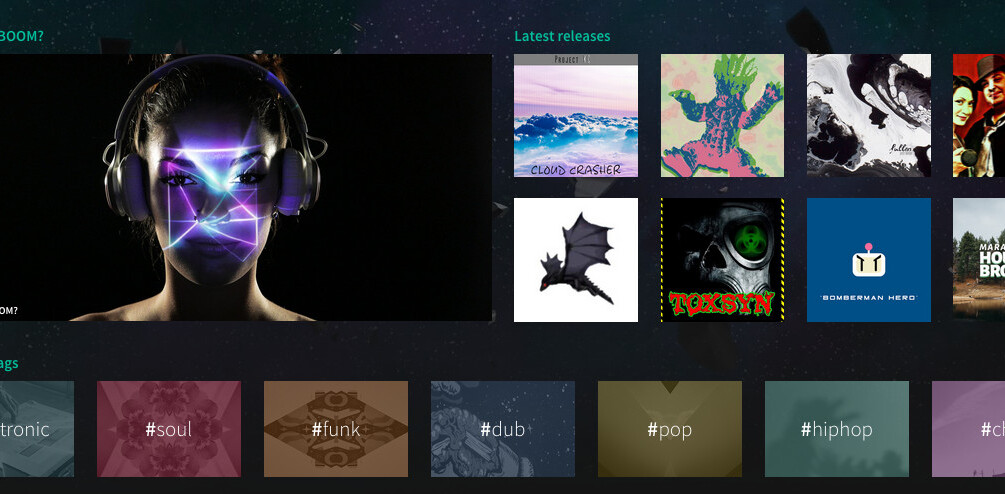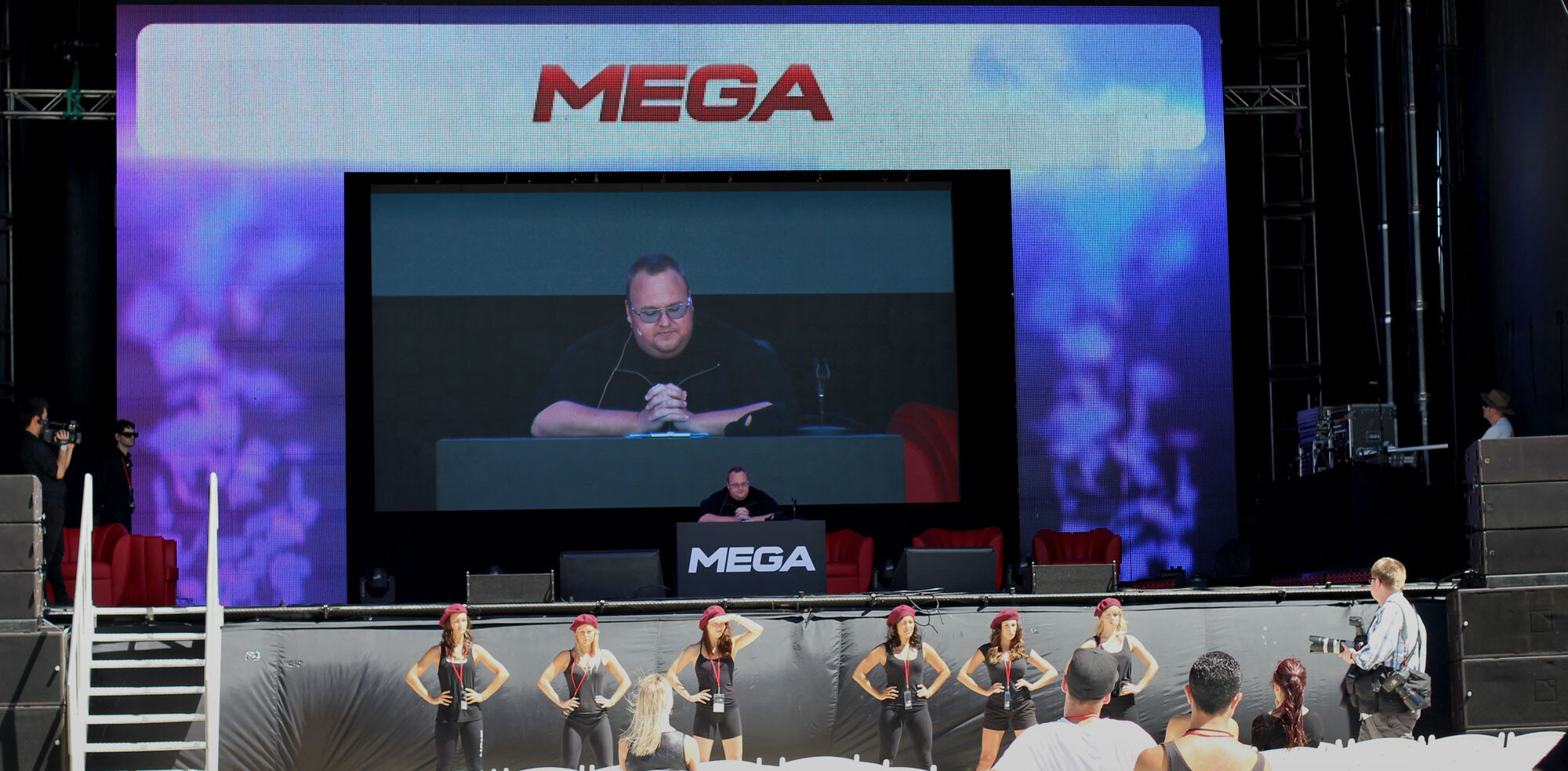
You don’t need a psychology degree to work out that Kim Dotcom is all about excess. From his rise to fame as a hacker in the 1990s to his key role in the establishment of the now defunct file-sharing behemoth Megaupload.com, he has always openly pursued his love of decadence. His preoccupations include the (seemingly relentless) pursuit of speed, power, and wealth: he also continually pushes back at institutionalised boundaries. Accordingly, Dotcom seems to corner more than his fair share of media focus for attention-garnering actions of both the legal and illegal variety.
There’s no doubt that Dotcom looms large in such an entrepreneurially driven and attention-dependent networked culture. Does this “boys and their toys” attitude also overlay a more multifaceted side, one where Dotcom actually holds legitimate insights into complex copyright issues currently plaguing our entertainment industries? Or is Dotcom simply adept at pulling off a flamboyant adult version of an Augustus Gloop-style persona , one cleverly designed to mask digital piracy?
Kim before the “Dotcom”
When encountering the name “Kim Dotcom” you’d be forgiven for assuming that his last name is the punch line of some elaborate hacker joke. You may even think the Dotcom name is a trickster jab at mainstream co-option of nerd cred, or some hangover pop-culture cheesiness perhaps derived from Internet meme culture. The 38-year-old German born Dotcom in fact made the name change from Kim Schmitz to Kim Dotcom legally back in 2005, as a type of tribute to the tech that’s made him exceedingly wealthy and afforded him a type of outlaw infamy.
Alongside the legal adoption of his distinctive moniker, Dotcom also employs various designations including “Dr Evil”, “Kim Tim Jim Vestor“ and “Kimble”. This last alias is supposedly ripped straight from the Jack Kimble character from the TV serial (and subsequent movie version) The Fugitive. Dotcom even used this Kimble alias in his early forays into hacking, where he began to foster a set of urban myths surrounding his technical capabilities as a Cybersecurity expert, a leader of an Internationally-based hacking collective, and a PBX System infiltrator (among others).
Despite whether the majority of Dotcom’s hacking activities were in fact fabricated on his own behalf, in 1998 he was charged in a German court with multiple counts of computer fraud and data espionage. His two year sentence was suspended, but in 2002 Dotcom was then fined to the tune of $130,000 for insider trading: it’s been alleged that he made €1.5 million as part of this ‘pump and dump’ process.
It was also in 2002 – after relocation to Hong Kong – that Dotcom registered “Kimpire Ltd”. Under one version of Dotcom’s supposed LinkedIn page – where interestingly he is still labelled as “Kim Schmitz” – Kimpire Ltd is labelled a “Venture Capital and Private Equity” business. Dotcom (Schmitz) himself is labelled as the “Ruler of the Kimpire” and having been educated at “the University of LIFE”.
It was in the early 2000’s that Dotcom’s hedonistic side kicked it up a gear, with outlandish purchases of high-end cars and constant partying becoming the norm. Dotcom’s growing obsession with speed and disregard for social conventions can be seen in the following footage taken at the Moroccan Gumball 3000 Rally, where Dotcom says he tried to bribe Police in an attempt to slow a rival driver. When Dotcom catches up to his competing driver, he says: “…I show you now what I’m doing with guys that are challenging me – I bump them in the back…[laughter]” and proceeds to do just that by twice tapping the car’s rear with his car’s hood.
http://www.youtube.com/watch?v=64l-VFxvKjA
Dotcom then formed a company called Data Protect Ltd in 2003. In 2005, this company would be renamed Megaupload, a “cyberlocker” site specifically designed for file-sharing and digital content distribution. At its height, Megaupload reportedly accounted for 4% of all Internet traffic with 50 million visitors a day, with Dotcom making $42 million from the enterprise in 2010 alone.
Supersize or bust
In 2012, everything about Dotcom seems supersized. “Hulk” could be his middle name, and given his preference for juvenile aliases, it seems entirely possible. From his oversized 6 foot 6 inches/300-pound-plus physical frame, to his almost ridiculously opulent New Zealand mansion – not to omit his model wife – everything about Dotcom tips strongly towards the extravagant.
His rented property looks like a mix of children’s playground and playboy manor. In 2010, Dotcom was denied the ability to purchase it outright after being denied the necessary good character assessment by the New Zealand government. He was, however, granted residency under the investor plus classification after making a ten million dollar investment into government bonds. It has since been revealed that the New Zealand government tried to keep the residency application confidential. Combine this fact with current payoff allegations to key (no pun intended) New Zealand politicians, and it seems Dotcom courts controversy in most aspects of his life – including in relation to his everyday living arrangements.
Rented or not, Dotcom’s property radiates money and excess in equal measure. A scan of Dotcom’s Twitter feed shows similar extravagances: mixing successful entrepreneurial chic with high-sensation-seeking cred is more than acceptable to Dotcom. He seems quite comfortable focusing on overindulgence when driving, eating, gaming and spending money. For a short period at the beginning of 2012, Dotcom even held the title of the world’s number one ranked Modern Warfare 3 player under the handle “Megaracer”. Oddly, Dotcom has stated that he doesn’t seek a high using chemical means – a possible concession to experiences from childhood (it’s been reported that Dotcom’s father was an alcoholic).
The pricking of the Megaupload bubble
In January 2012, Dotcom and his Megaupload team had their lives ‘shock-and-awe’ altered as the heavy arm of copyright enforcers sought to put a stop to their content distribution. A military-style raid on his New Zealand mansion resulted in Dotcom’s arrest after a cat-and-mouse search for him at the property. The megaupload.com domain was seized by the US Department of Justice, with Dotcom’s money and assets frozen. Dotcom and his co-accused (including Mathias Ortmann, Bram van der Kolk and Finn Batato) were subsequently charged with “…online piracy, including racketeering, conspiring to commit copyright infringement, and conspiring to commit money laundering.” Dotcom was eventually released on bail and is currently residing back at the Coatesville property.
On the 1st of March 2012, 5 weeks after the Megaupload raid, John Campbell from Campbell Live obtained an exclusive interview with Dotcom. Dotcom starts the interview by stating that the raid was nightmarish and horrifying for his family, especially his pregnant wife. He also said that he was facing “…a very interesting situation”: an unusual turn of phrase for someone currently battling charges that could result in a hefty prison term.
When Campbell queries Dotcom about the origins of Megaupload, Dotcom replies:
One day I was sending a file to a friend via email and I got a message back saying the file is too large and the mail server has refused to send it. So I thought what I can come up with, what can I do to solve that? So I basically created a server where I could upload a file, and got a unique link and then I would just email that link to my friend and he would then get the file and that’s how Megaupload started: it was just a solution to a problem that still exists today…
What’s also ‘interesting’ is Google’s recent announcement allowing Gmail users to send up to 10Gb while integrating with its Drive feature: a solution that, while far from optimal, could now combat this particular data-sharing problem.
Campbell also asked if the raid was completely unexpected, to which Dotcom answers:
The business is seven years old. We have been sued only once, never by any, you know, any movie company or big content company and we have spent millions of dollars on legal advice over the last few years, and our legal advisors have always told us that we are secure and we are protected by the DMCA which is a law in the US that is protecting online service providers of liability from the actions of their users.
Dotcom then stresses that Megaupload should not be held accountable for the actions of its users. It’s an interesting (if established) tactic indeed – to pass the entire responsibility for copyright infringement onto the user base, rather than acknowledge any type of overall accountability for any infringing copyright material.
When Campbell inquires about Megaupload and protections against any user copyright infringement, Dotcom says:
Supposedly – and that’s what everyone believed – is that the law is protecting us. We can’t be liable for actions of third parties. You know, as long as we follow a regime of taking things down that are reported to us, which we have done over all these years…we are protected according to the law. You know I find it very surprising that this is happening because…we had legal advice all these years telling us that we are an online service provider, and we are not liable for actions of third parties.
Again Dotcom asserts that he has depended absolutely on legal advice, rather than approaching the answer from his own moral base. Understandably, it would be exceedingly difficult to translate Dotcom’s ethics – including such hedonism and love of excess – into a logical, cohesive framework (it’s lucky Dotcom is an articulate individual). When listening to him in an interview such as this one, it is easy to see just how reporters such as John Campbell get struck by his charisma.
After Campbell puts it to Dotcom that senior Vice-president of Content Protection at the Motion Picture Association of America believed that he was the was the biggest copyright infringer in the world, Dotcom categorically denies it, stating: “I’m no copyright infringer”. He goes on to say he cannot be expected to know what content was being shared via Megaupload due to relevant privacy laws such as the US Electronic Communication Privacy Act. He also states that this is why Megaupload instituted their own Terms of Service that instructed users that they were forbidden to upload anything over which they did not own the copyright. Dotcom asserts that Megaupload voluntarily provided delete access to relevant parties to remove links to copyrighted material, with this facility expunging a total of 15 million links from the site.
When asked outright if he knew the contents of the file-sharing that was occurring, Dotcom cleverly appeals to the ‘internet everyman’ by referencing that:
Of course everybody knows that the Internet is being used for legitimate and illegitimate uses…
He then lumps Megaupload into the same copyright-infringing arena – and by proxy, himself – as other Internet juggernauts such as Google and Youtube.
The implications of Dotcom’s assertions that all online content providers are “in the same boat” illustrates his power of appeal, by categorising his company with other online moguls that adjunct-trade off the display of copyrighted information. It’s this type of ‘everybody’s doing it!’ rationale that makes Dotcom’s logic seem eminently reasonable in the effort to question just what passes for legal ownership in the digital sphere.
Later in the interview Dotcom makes a telling point, a point that goes to the core of the matter of digital piracy and issues surrounding illegal downloading and content duplication:
Everyone is in this cloud arena in this same business, has the same problems that we had battling piracy.
If Dotcom is right, and everybody is indeed ‘doing it’, then why have the authorities focused primarily on Megaupload?
Shameless shyster vs devoted family man
Earlier this month, Dotcom posted a photo of a helicopter chasing his car on his @KimDotCom twitter account. This is an example of just how finely Dotcom crafts his public image, by filling it with images of a man whose regular days include such shenanigans as trying to outpace an aircraft that’s pursuing him. He intersperses this with doting imagery (such as this) denoting himself as the impeccable family man, out with the wife on a perfectly normal outing.
This family-man image contrasts strongly with Dotcom’s almost caricaturist portrayal of women in his music videos. One example of the duality that Dotcom expresses in his public persona can be seen here:
Such off-the-stereotypically-sexist-shelf representation of women as covert gyrating strippers contrasting markedly with the following video that focuses squarely on his wife and his children (including twin girls).
Even given that the first clip mentioned above is a type of parody of 9-to-5 drudgery, the imagery still smacks of sexism/male gaze issues. The contrast of approaches to women-as-objects versus women-as-cherished-icons (plus Kim’s previous preference for the company of supermodels) highlights that just like his predilection for different monikers, you’re never sure which version of Dotcom you’re going to encounter.
Megabox and obstacles for “Me.ga”
Dotcom’s obvious love of music is in part directing his plans for the future, with his Megabox streaming music service slated as an upcoming project. Just how he intends to navigate the tricky copyright intricacies involved is yet to be revealed. Dotcom most likely has a multitude of methods to counteract relevant opposition, yet there’s no guarantee these methods will be ultimately successful.
In early November of 2012, Dotcom proclaimed he was releasing a new digital file sharing project in January 2013. This service was to be hosted at (surprise) me.ga, a domain controlled by Gabon, a Central African state. Dotcom’s plan was soon to be thwarted when on November 6th, Gabon’s communication minister reported that the Gabon government had suspended access to the “.ga” domain suffix, stating that his country:
…cannot serve as a platform or screen for committing acts aimed at violating copyrights, nor be used by unscrupulous people.
Dotcom fought back by announcing that he’d registered the domains mega.co.nz and mega.net.nz. He has also recently reworked kim.com to read like an Internet freedom propaganda site, even going so far as to title himself a “freedom fighter” in his Twitter profile description, and openly flaunt his schmoozing with Steve Wozniak. He’s also emulated (or perhaps even brazenly appropriated) footage from the hacktivist collective Anonymous and the Occupy movement campaigns, equating his legal dilemma as synonymous with their struggle against the introduction of SOPA and PIPA.
Inconsistencies of Dotcom’s advocacy of a free Internet manifest in his previous ratting out of other file-sharing providers. In this 2011 email to Paypal, Dotcom has no qualms in flip-flopping in regards to championing Internet freedom:
Our legal team in the US is currently preparing to sue some of our competitors and expose their criminal activity. We like to give you a heads up and advice…[for]…you not to work with sites that are known to pay up loaders for pirated content. They are damaging the image and the existence of the file hosting industry (see what’s happening with the Protect IP Act). Look at Fileserve.com, Videobb.com, Filesonic.com, Wupload.com, Uploadstation.com. These sites pay everyone (no matter if the files are pirated or not) and have NO repeat infringer policy. And they are using PayPal to pay infringers.
Dotcom in a nutshell
Dotcom’s articulate and charismatic presence makes it impossible to discern which of his public persona versions are the real deal. So is Dotcom nothing more than a hedonistic manipulator keen on pedalling his “Information Wants to be Free” mantra via a flamboyant persona engineered specifically for the Internet age, and in doing so, peddling the worse type of hypocrisy?
Or does Dotcom instead embody the shifting “truthiness” of today’s copyright landscape: that it can be bought, played and stylised by a type of entrepreneur that promotes new content distribution models, one rich to the hilt and not afraid to take on established systems of power? Perhaps Dotcom can be considered a little of one and a large whack of the other. You decide which is which.
Image Credit: Sandra Mu/Getty Images
Get the TNW newsletter
Get the most important tech news in your inbox each week.




